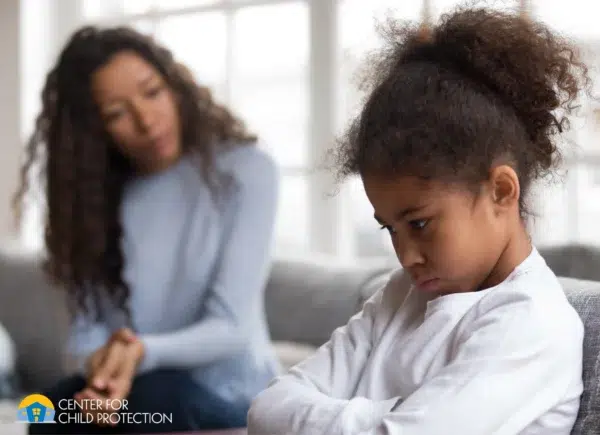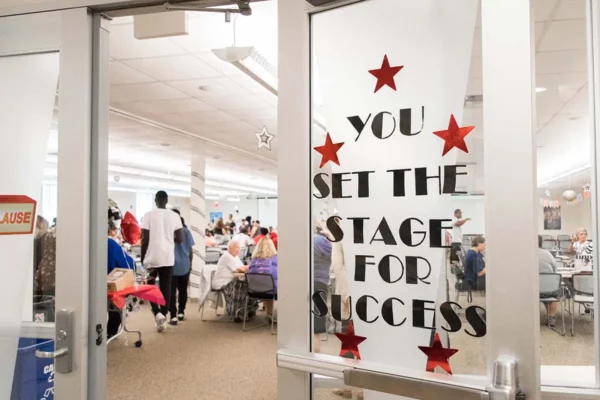The United States has seen great times of light and times of unimaginable darkness – i.e. the Great Depression, 9/11 or the assassination of Martin Luther King. These moments have a way of defining us as individuals and as communities, whether that be as families, friends, cities or a nation. Unfortunately, it’s fair to say we’re seeing one of these defining moments take its course in our daily lives – COVID-19.
With the given circumstances of stay-at-home, stressors may be multiplied with the fulltime addition of kids. “As if just having all the kids home 24/7 isn’t a big enough stressor, it has been compounded with the emotional, financial and educational stressors brought on by the current events,” Kristy Demers, Center for Child Protection Family Relational Therapist (FRT), said. (Aka it’s fair to give yourself a pat on the back because as a global community and as individuals, we are going through it.)
How Stress Affects Abuse
What does stress have to do with abuse? It’s been shown that the likelihood of abuse actually increases during these difficult and defining times. According to Center FRT Andrea Venegas, our internal states (e.g., calm, alarm, terror) affect how we function and make decisions. When calm, we’re able to access all parts of our brain – this can lead to creativity, empathy, etc. However, when one feels threatened, they go into their “alarm” state that “will affect their capacities for thought and control over their own behavior.” Basically, our brains can’t function at the same level when we feel threatened as when we’re unaffected/content.
As parents, it’s important that we respond instead of react immediately to our children (which could lead to more aggression and less empathy or rational thinking).
Regulation and dysregulation are common terms in the work we do. Our Chief Clinical Officer, Miriam Jansky put it into laymen terms for us – “Regulation simply means feeling calm so that you are able to think about things clearly… in other words, to not let emotions take over.”
According to Dr. Bruce Perry, M.D., Ph.D., founder of the Neurosequential Model (NM), “a dysregulated adult will never regulate a dysregulated child.” Self-regulation is crucial for parents during these times. You can’t help others if you don’t help yourself first.
YOU GOT THIS!
While it may seem like you are just barely hanging in there, it’s important to have appropriate expectations right now. A global pandemic affects each person in different ways. We need to find ways to connect with our children and normalize a routine. Demers tries to help her clients think about what expectations are reasonable for them individually and figure out what works best for their family. Safety and mental health come first!
“Just breathe.”
However, it’s not the end of the world if children or adolescents are spending more time on their screens right now if it gives you a chance to take a breather. Just know what sites children visit and monitor appropriately.
“Every parent needs a break and it’s a good opportunity for parents to model to their children by telling them they are going to the bedroom/kitchen/etc. to take a break for a few minutes and to let the child know they will be back.” – Miriam Jansky, Chief Clinical Officer
Visit Netsmartz for more on Internet safety and protecting your kids online.
Even though you are spending all of your time with them, talk and listen to your family. Ask your children about what they’re feeling. Remind them of their importance and explain why social distancing and external cancelations contribute to the greater good for all of us. And lastly, address their fears. Children old enough to see the news and grasp general knowledge may begin to worry. It’s important to help them understand what they’re viewing and be honest but reassuring about the measures we are taking.
Stay Connected
As “social distancing” becomes a new daily norm, this is really about physical distance, not necessarily isolation/social distance. “I’ve been impressed to see how the families that I work with have been using social media,” Venegas said. “For example, one of them found a live prayer every night at 10 p.m. on Facebook and she’s uses that time to pray, not only with her daughters, but also with people around the world.”
“Another parent has been coloring with his children at the kitchen table and taking a walk together at the same time each day.”
Connecting with your kids should be simple. For example – cooking, cleaning, reading, talking, drawing and sometimes just sitting with them can have an impact.
Regulating Activities – in one minute or less!
- Open a window
- Keep a routine – write it down if you can!
- Step outside for a little every morning/evening
- It’s okay to let kids watch TV if you need a break
- Create a handshake
- Volcano breathing
- Take a drink of cold water if feeling upset/dysregulated
- Create a chant and do it throughout the day
- Listen to upbeat music while eating or getting ready in the morning
Physical distance is crucial to prevent further spread of the virus, but at the same time, social connection is more important than ever to preventing abuse in the home. We get it. Times are hard. Times are uncertain. But keep in mind, times have a timeframe – the hardships won’t last forever!












